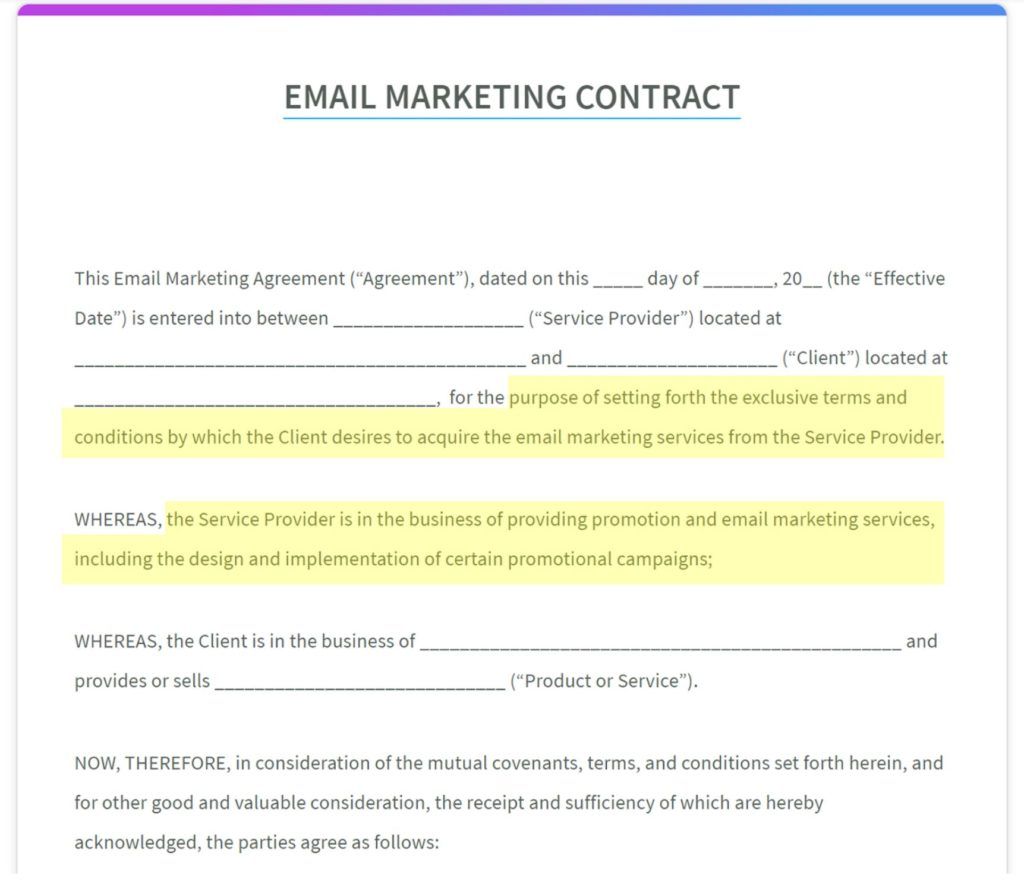Is Your Contract Enforceable?
7 Key Elements of an Enforceable Contract
CHAPTER 8
When drafting agreements for your business, it is vital to ensure the contract will be considered enforceable in a court of law.
A contract is useless if it does not contain specific elements. A cake is not very good if it does not include essential ingredients like milk and eggs. The same is true in contracts. So, it is critical to ensure your contract is composed of all of the right ingredients. When drafting agreements for your business, it is vital to ensure the contract will be considered enforceable in a court of law.
The legal definition of enforce is “to compel observance of or obedience to.” An enforceable contract is an agreement that can be levied in a court of law. If the court finds the contract is enforceable, the court will require the parties to fulfill their obligations under the agreement. If they are unable to, the non-breaching party may be entitled to other remedies.
1. Intent
The parties must have the intent to form a contractual relationship. The intent here is determined objectively. Basically, would a person under the same or similar circumstances intend to create a contractual relationship?
At the beginning of a contract, after the names of the parties have been listed, you will see what is known as the “recitals” or the “preamble” of the contract. The recital provides basic background information. Some people may wonder, are recitals enforceable? It is important to know that the recitals themselves are not enforceable, but it does show each party’s intent and expresses the overall purpose of the contract. The recital of a contract typically includes legalese but is simply there to include basic information and the purpose of the agreement.
Example of a Recital in a contract, highlighted below:

2. Offer & Acceptance
The offer is the first required element of a contract. No offer = no contract. It is the offeror’s (the person offering the promise) intent to form a contract with the offeree (the person the promise is extended to). Once the offeror extends the offer, it only becomes binding once the offeree affirmatively accepts.
An offer can be articulated in an email, proposal, or other expressed assent to the offer. The offeree does not have to accept the offer. The parties can negotiate and agree on specific terms. The parties must unambiguously and mutually assent to the terms agreed upon, binding the contract. The terms should be straightforward and definite.
3. Consideration and Value
The parties must demonstrate that they were each provided consideration. This means that each party provides something of value. This is an exchange. For example, “I will pay you $20 to shovel snow.” The other party agrees to shovel the show for $20. The first party benefits from having a snow-free driveway. The other party benefits from receiving $20 for his service. Without consideration, the contract is unenforceable.
4. Meeting of the Minds
Mutual assent and meeting of the minds is just as it sounds. The parties must have a clear and mutual understanding of their obligations under the contract. All details agreed to should be in writing to further prove that the parties had knowledge and agreed to the terms before signing.
5. Written Contracts & Does a Contract Need to be in Writing
Contracts can either be an oral contract or written contract. Verbal agreements can be enforceable but are difficult to prove. Written contracts provide actual evidence of what the parties agreed to. Some types of agreements must be in writing to be enforceable. A good rule of thumb is to always implement a written contract. Whether or not a contract is valid lies within its details. If a contract omits pertinent information, it may be considered invalid.
6. Capacity
Parties to a contract must possess the requisite capacity to enter into a legally binding contract. If a person lacks capacity, the agreement “voidable.” A contract will more than likely be voidable in the following circumstances:
- Minors – Minors do not have the required capacity to enter into a contract. Minors under the age of majority (usually under 18, but varies state to state), cannot be held to an agreement they entered into. There are certain caveats to this rule, so it is best to consult with an attorney to ensure you are in compliance with your state’s laws. A minor can be a party to a contract but may require a parent or legal guardian to sign.
- Mentally Ill – The standard for one’s mental capacity is determined on whether the person understood the meaning and overall effect of the agreement. States use different tests to assess mental ability, such as the “cognitive test,” “affective test,” and “motivational test.” Courts have different specifications on whether or not the person lacked mental capacity. Overall, the person needs to be of sound mind when entering into the agreement.
- Under the Influence – Generally, a person who is under the influence of drugs or alcohol lack the capacity to enter into a contract. Court rulings on the agreement’s voidability across the board vary depending on specific circumstances.
Overall, if you are unsure if the person lacks capacity, you should consult with an experienced attorney.
7. Force Majeure Clause
A “force majeure” clause is found in several business contracts. The clause essentially withdraws the contract in circumstances that are beyond the parties’ control. The events of which would make performing the duties under the agreement impractical or impossible. Usually, the clause covers “Acts of God,” which refers to natural disasters. It also speaks to pandemics, threats of terrorism, war, and other disruptions.
Most contracts include a standard boilerplate force majeure clause. However, a contract may still be impractical, but still possible. So, you may want to consider fleshing out the details of what may trigger the clause.
Make signing contracts a joy-filled experience
ApproveMe lets you transform the moment that matters most to your business…signing on the dotted line into the most joyful experience – wall without leaving your site
When is a Contract Unenforceable?
Even though a contract is a legally binding agreement showing the parties agreed to the terms of a deal, a contract can be deemed unenforceable for the following reasons:
- Lack of Capacity
- Mistake
- Impossibility
- Misrepresentation
- Violation of Public Policy
- Unconscionability
- Duress
- Non-Disclosure of Material Information (suppression)
- Fraud
- Undue Influence
- Illegality
- Unexecuted Agreement
What is a Contract of Adhesion?
Have you ever bought a car or taken out a loan? If so, you have signed what is known as a contract of adhesion. These types of contracts are drafted by a party that holds a substantially greater bargaining power over the other party with less bargaining power. They are known as “standard form contracts” or “boilerplate contracts.” They are more streamlined and cut out room for negotiations of the terms. Examples of adhesion contracts include:
- Loan Agreements
- Licensing Agreements (when downloading an app on your phone)
- Insurance Contracts
- Internet and Phone Agreements
The term “adhesion” comes from the notion that the party with the weaker bargaining power must “adhere” to the terms of the contract. Adhesion contracts are generally enforceable unless they are grossly unfair or unconscionable. Unconscionable means that it is so unfair that it “shocks the conscious.” If a judge finds that it is unreasonable, he or she may strike the unenforceable provision or decide to throw out the entire contract.
What Types of Contracts Have to Be in Writing?
While verbal agreements are sometimes binding, there are situations where a written contract must be in writing to be enforceable. This concept is known as the statute of frauds. Here are the types of contracts that, under the statute of frauds, must be in writing:
- Marriage and any promise made in connection within the marriage
- Contracts that cannot be finished in less than one year
- Contracts dealing with the sale of land
- Executor’s Agreements
- Contracts for the sale of goods that is over $500
- Surety
While it is prudent to obtain written contracts in all business agreements, the above under the statute of frauds are required to be considered enforceable in a court of law.
“While verbal agreements are sometimes binding, there are situations where a written contract must be in writing to be enforceable.”
Is a Contract Enforceable if it is Not Signed?
Well, it depends. There is a circuit split where some courts allow it, and some do not. Courts generally determine if the contract is enforceable by each party’s action and intent concerning the agreement. If the parties proceed as if the contract was signed, the court may find it enforceable by the parties’ actions. It is always best to make sure you and the other party have signed the agreement at hand to avoid any future legal headaches.
The Importance of Consulting an Attorney
Attorneys deal with contracts on a daily basis. It is important to reach out to an experienced attorney to review your contract and discuss its overall enforceability.
ApproveMe’s Legally Binding E-Signature Tool
A contract is not enforceable unless it is signed by all of the parties. ApproveMe’s WP plugin is the SOLUTION. Our easy to use plugin ensures your documents are signed quickly by the appropriate parties. The parties are also provided with a copy of the executed agreement. ApproveMe expedites the signature process! Let’s get you hooked up with our plugin today!
Looking for a contract management software designed to wow your signers?


TABLE OF CONTENTS

WP E-Signature by ApproveMe.com, helps you collect, secure legally-binding signatures that accelerate your contracts.


 How to Draft a Contract
How to Draft a Contract 




